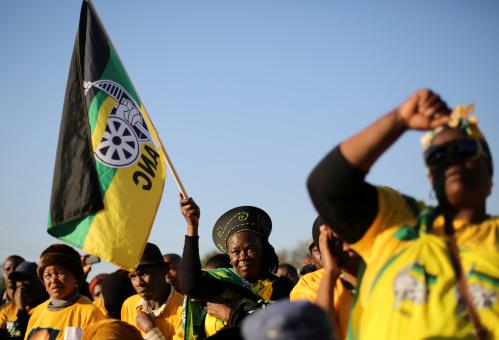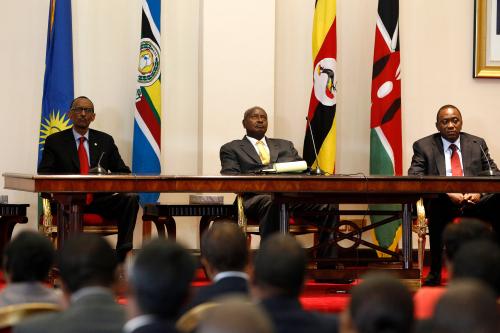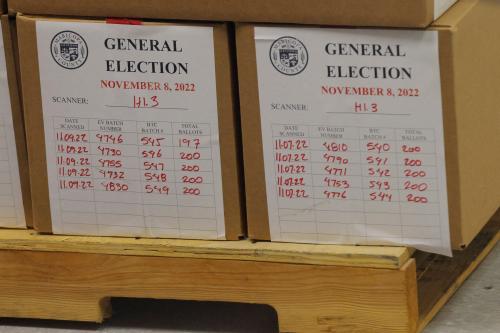Kenya’s banking sector records profit losses while the country becomes the largest intraregional investor in Africa
This week, the Central Bank of Kenya released its 2015 Bank Supervision Annual Report, which details the performance of the Kenyan banking sector. In 2015, pretax profits across the sector declined by 5 percent, the first recorded drop since 1999. The report attributes the decline in profit to the increase in expenditures. The 9.2 percent rise in assets was countered with a 16 percent increase in expenses, driven by the increase in loan loss prevention and interest expenses. The Kenyan banking sector experienced a few setbacks last year as two banks (Dubai Bank Kenya LTD and Imperial Bank LTD) were placed under receivership. Given Kenya’s present economic growth outlook, though, the Central Bank of Kenya estimates that the sector’s performance will improve in 2016.
Despite this setback, Kenya continues to play a leading role in sub-Saharan Africa’s investment environment. Ernst and Young’s latest Africa Attractiveness Program report finds that, in 2015 Kenya surpassed South Africa to become the largest intraregional investor in sub-Saharan Africa. The majority of investment from Kenya was directed toward countries in the East African Community. Kenya also surpassed other non-African countries as it moved from being the 13th source of foreign direct investment towards sub-Saharan Africa in 2014, to being the 7th source of investment in 2015, investing $1 billion and generating 1781 jobs. Seventy-eight percent of investment was directed towards the financial and service sector. While Kenya invested in the largest number of projects (36 against South Africa’s 33 projects) the total monetary value invested by South Africa is double that of Kenya. Overall, the United States, United Kingdom, France, the United Arab Emirates, and India were the largest investors in Africa, with a combined $22.9 billion invested and 56656 jobs generated.
Nigerian government resumes payments to Niger region militants
This week, the Nigerian government announced the resumption of payment disbursement to former militants in the Niger River delta. In 2009, the Nigerian government struck an amnesty deal with a group of Niger Delta militants, in which payments were given in exchange for the laying down of arms. Those payments were stopped due to a lack of funds and have now resumed due to the increased unrest of the region. The country has faced increased attacks from a different militant group this time: the Niger Delta Avengers, which has been recently bombing oil pipelines with the intent of disrupting the government’s control of the region’s natural resources. The militant group claims to be operating with the intent of returning the economic benefits of the natural resources to the local people through autonomy of the region or complete control of the crude oil.
In other Nigerian news, militant group Boko Haram has been experiencing leadership disputes. Abubakar Shekau, the old leader of the militant Islamic group of Nigeria, Boko Haram, who has been unseen and unheard of for over a year, has re-emerged, declaring his control over the group in an audio message. He has accused the Islamic State (IS) and IS declared leader, Abu Musab al-Barnawi, of staging a coup against him earlier this week. IS has criticized Shekau for using children as suicide bombers and killing Muslims (though the majority of IS victims are also Muslim). Analysts are unsure of the consequences of the return of Shekau, with some believing that the newly fractured group has lost a lot of its power by these tensions and may focus its efforts on clashes between the foot soldiers loyal to each side. However, some analysts fear that the additional disruption in the region could easily lead to more deadly and unpredictable actions.
South African opposition wins big in major municipal elections
On Wednesday, August 3, South African voters in the major municipalities of Nelson Mandela Bay (Port Elizabeth), Johannesburg, and Tshwane (which includes the capital, Pretoria) struck a blow to the ruling African National Congress (ANC) party. At the time of this writing, the rival Democratic Alliance (DA) has been voted into power in Nelson Mandela Bay, and the results remain very close in the other major municipalities. The DA also maintained its hold on Cape Town. Analysts note that this result seems to be following a trend, as ANC support seems to be dropping in urban, middle-class areas, which are growing. In addition, according to the BBC, the ANC has won over 60 percent of the vote since its inception. However, this time around, with 94 percent of the votes counted, the ANC, while still leading overall, only managed to gather 54 percent of the votes nationwide.
Though the ANC, which has governed South Africa since the end of apartheid, has enjoyed high popular support, recent trends—including corruption scandals following President Zuma, an employment rate of 27 percent, increasingly poor service delivery, and the risk of a credit downgrade—have disenchanted voters. The Economist even noted that “57 percent of South Africans believe the ANC has ‘lost its moral compass.’”
For more on what these elections mean for South Africa’s political future, see Steven Friedman’s blog, “South Africa’s local elections may augur a political shift.”
The Republic of the Congo defaults on its international debts due to low oil prices
On Tuesday, S&P reported that the grace period had run out on the Republic of the Congo, which had failed to pay the interest on $478 million in bonds due on June 30. The yield on the bond had risen to 9.5 percent in 2007. In its announcement, S&P also noted that, due to the default, it would be lowering its credit rating for the Republic of the Congo from B-/B to SD/D (selective default). Moody’s and Fitch similarly downgraded their ratings for the country to “six notches below investment grade” and “restricted default,” respectively. Reuters also reported that the country’s 2029 dollar bond is in historic low.
The central African country’s economy has particularly suffered in recent months due to the major drop in the price of oil, which made up 70 percent of the government’s revenues in 2014. However, Moody’s reported, “The government indicates that the missed payment relates to an administrative error, rather than liquidity shortages, and stipulates that the payment will be made shortly.”





Commentary
Africa in the news: Kenya’s banking sector losses, Nigeria’s oil militant payments, South Africa’s municipal elections, and Congo’s default
August 5, 2016